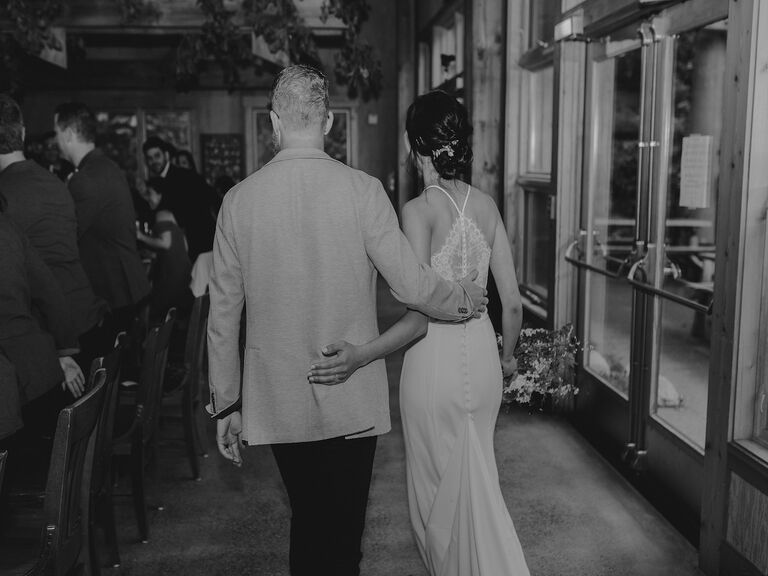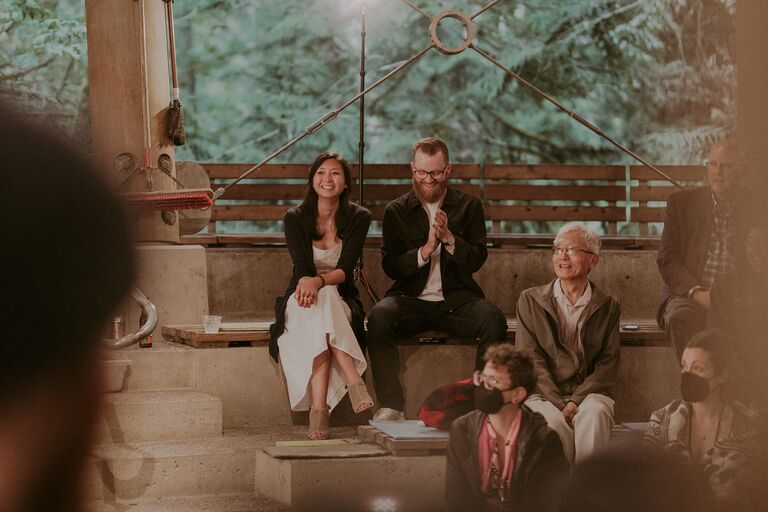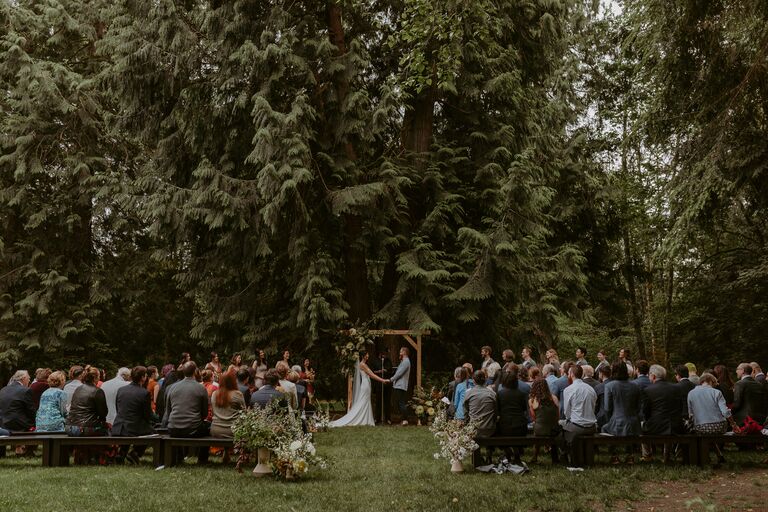What We Learned About Our Chosen Families Throughout Our Engagement
A marriage is never just between two people. That's the refrain my mother would tell me repeatedly over the years as a way to caution against any potential partners whom she disapproved of, a way to remind me that I needed to take other people (read: her) into consideration when it came to my love life. But when my now-spouse and I got engaged in July 2019 atop what we dubbed our "forever mountains," it truly did feel like we were the only two people in the world. I can still see the unending blues and greens of the Catskills rolling out beneath us, can still feel the uncontrollable flutter in my chest when he revealed the ring box hiding underneath his cap. Saying "yes" was never a question; what was unknown for both of us was what exactly we were agreeing to.
It was only over the course of our inadvertent multi-year engagement that we started to understand that—as with anything in life—marriage, and our wedding, could be something we defined on our own terms.
By its most basic definition, marriage is meant to bring together two individuals for the purposes of companionship, love, and support—as recognized by the law. Up until our engagement, we already had and deeply felt all three of those things, so we weren't sure what difference one piece of paper might make in the long run. A big part of our relationship, after all, was how we encouraged each other's continued growth and change. We worried that making things official could lock us into traditional gender roles we both felt uncomfortable with. But getting married also meant we would be able to legally care for each other in ways we couldn't as long-term partners or even fiancés. And that, for all of its practical undertones, was perhaps the most romantic thing either of us could do for the other person.
We began planning our wedding in earnest in the fall of 2019, hoping that we could continue forging our own path forward, redefining terms and expectations along the way. But life isn't always so predictable. In what turned out to be an incredibly astute decision, we opted to get married at the courthouse first, with just our parents as our witnesses. On a rainy night in October, we doffed our raincoats and stood under the harsh fluorescent lighting of a city courtroom and said "I do." In place of personal vows, we wrote letters to our parents that we read aloud during our mini-reception afterward, the six of us sharing appetizers and drinks and stories. They were the people who had raised us, after all, so it only felt appropriate to spend that precious time together honoring them. Watching our parents laugh uproariously and exchange tales of our childhood made the whole idea of marriage and weddings seem worth it; hadn't they all sacrificed so much so we could be the people that we had become? Didn't we want to celebrate the other folks who had helped shape us along the way, too?
That December, we set the date for a larger celebration with our families and friends: September 5, 2020. We both got swept up in the flurry of planning to-do's — securing a venue, researching vendors, assembling our wedding party — the most challenging of which was locking down a guest list. Both my partner and I have large extended families, and it felt impossible to invite some family members and not others, even if we didn't always have the closest or best relationships with everyone. This was a part of the wedding tradition that we both felt wary of: needing to appease an unspoken familial force by sacrificing our own senses of self. We'd heard the trope all-too-often that weddings are for other people, not the couple themselves. Getting married in a small civil ceremony with our parents had felt special, personal, so very us. What we didn't want to happen in planning a larger celebration was to lose that sense of intentionality. But — as happens with many couples wedding-planning — the desire to people-please got the best of us and we acquiesced to our parents' requests to invite every last aunt, uncle, and distant cousin.
Fast-forward a few months, to the beginning of March 2020 and the start of the pandemic. In an abundance of precaution, we made the call to postpone our big day by a year, to September 2021. Surely by then, things would have calmed down and it would feel safe to gather again. Still, we spent the next year hesitant to talk about the wedding, unsure of how to broach the elephant in the room when there was so much loss and devastation happening on a global scale. Was it ridiculous for us to continue holding out hope for a "normal" wedding, full of hugs and close conversations and dancing, when even dropping off care packages to friends involved masks, sanitizing, distancing? I oscillated between feelings of guilt — for wanting a larger celebration when we'd already been fortunate enough to get married pre-pandemic — and feelings of sadness, that the world was in such a sorry state that joy felt superfluous. Was hosting a wedding asking too much of our loved ones, many of whom would have to travel? We felt the burden of indecision.
That spring, things didn't seem to be getting much better. We bumped the wedding back a second time, to June 2022. We kept our fingers crossed that the third date would prove possible. Postponing the celebration not once, but twice, forced us to ask the most difficult question of all: Why did we want a wedding anyway, when we had been so unsure about marriage in the first place? Wasn't our reluctance to ascribe to traditional gender roles an indication that maybe a big wedding just wasn't in the cards for us? Besides, due to our twice-postponement, many of our blood relatives could now no longer make it; health issues made it difficult for many of our older relatives to travel, and scheduling conflicts made it hard for distant cousins to attend. Our guest list, once resembling a family call sheet, now had gaps and omissions all over the place. What did this mean for the sort of celebration we would be hosting?
That's when my mother's refrain began to take on new meaning: A marriage is never just between two people. The intimacy of our civil ceremony was meaningful because it reminded us of the support systems that had helped us in our journey to becoming. The best way to honor our union, then, was not by doing things out of obligation, but intentionality: rethinking the definition of "family" and turning the wedding into a celebration of our community. Our chosen families. This felt to be the truest expression of our relationship, which has always been defined by our love for gathering people around words, story, and good food and drink. The pandemic laid bare many systems and institutions, and for us, that meant digging into the roots of marriage and asking ourselves why and how on a regular basis. Why was marriage important to us, and how would we honor our individuality within that institution? Having two-and-a-half years to noodle on the concept and what we wanted it to be was an unexpected blessing. It gave us a newfound appreciation for all the people in our lives whom we had crossed paths with in ways big and small, and a renewed respect for the effort it takes to really show up for one another.
Queer folks have long understood the necessity of finding their "chosen families": nonbiological kinship bonds wherein individuals experience safety, support, love, and respect. Family can look like many different things, and blood ties don't always delineate who is and isn't kin. There is so much to be learned from this more fluid way of seeing things. For us, it took the pressure off the wedding to have to look and feel a certain way and allowed us to really make it our own. What I realized over the course of the pandemic was that I wanted and needed to be more mindful with how I expended my energy, and that included whom I spent time with, and how. When it came to planning our wedding, then — a celebration that brought together so many individuals from disparate parts of our lives — it felt paramount to foreground the why. We didn't want a wedding that bound us to the constraints of tradition, but one that would redefine what marriage and family and relationship could look like for our particular kind of love. And a big part of that had to do with who we surrounded ourselves with on that momentous day.
So on June 4, 2022, when we were finally able to host our wedding, it centered our chosen family: the friends, colleagues, coworkers, mentors, and yes, some blood relatives, who had made the decision, time and again, to show up for us. And us, them. People shared stories around a massive bonfire, passed dishes served family-style, wrote us letters of encouragement and celebration. There were godparents I hadn't seen in years, acquaintances-turned-friends during the pandemic, and colleagues whom I had only met over Zoom. Even our photographer and videographer, whom we'd hired back in late 2019, felt like creative kin by the time we were pronounced costars for life. What linked them all was their willingness to show up throughout the ups and downs of life amid the pandemic — through loss and health scares and boredom and uncertainty — and that's what made each of them family to us. A marriage is never just between two people, my mother had said. That day, looking out at our community, at our chosen family, toasting us into a next new lifetime together, her words resonated with renewed clarity. I now know better than to presume definitions by default; it's our effort to be there for each other that matters in the end.


























